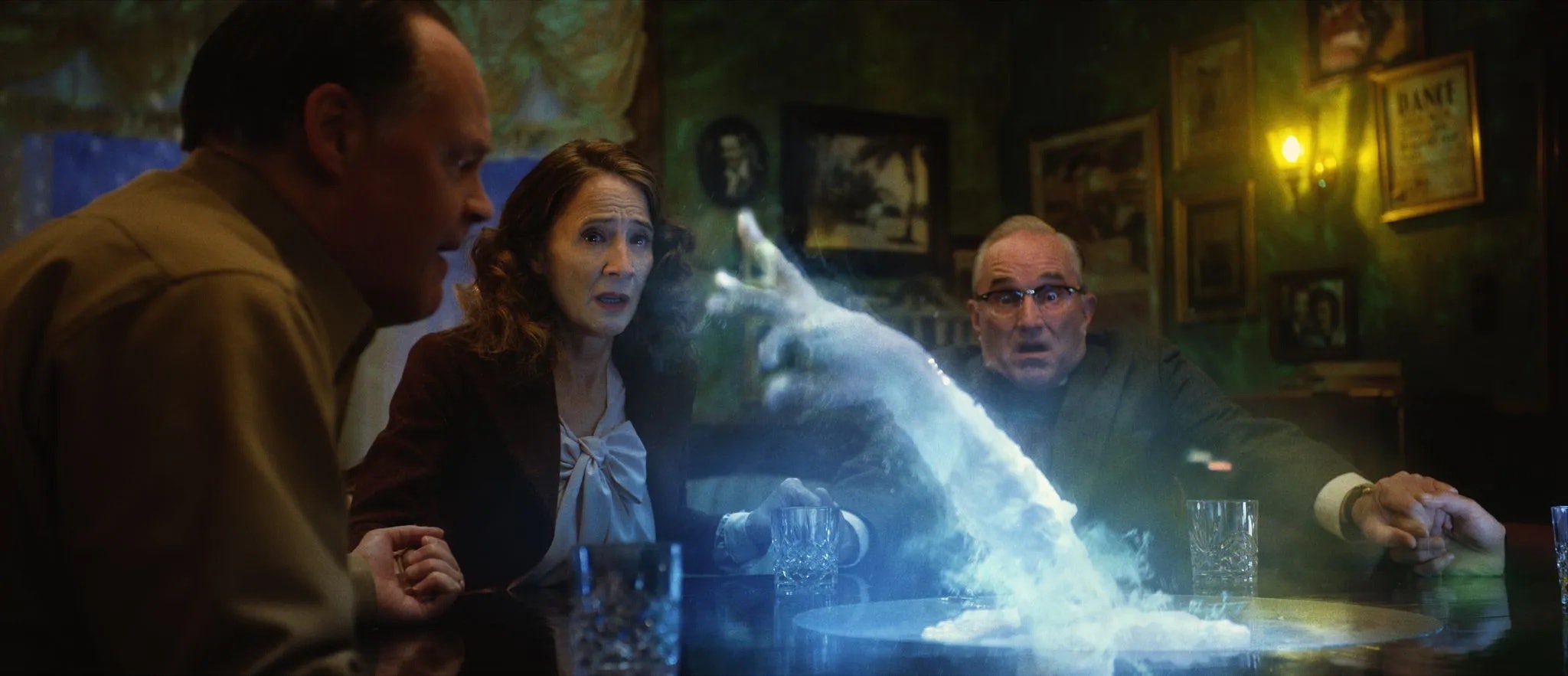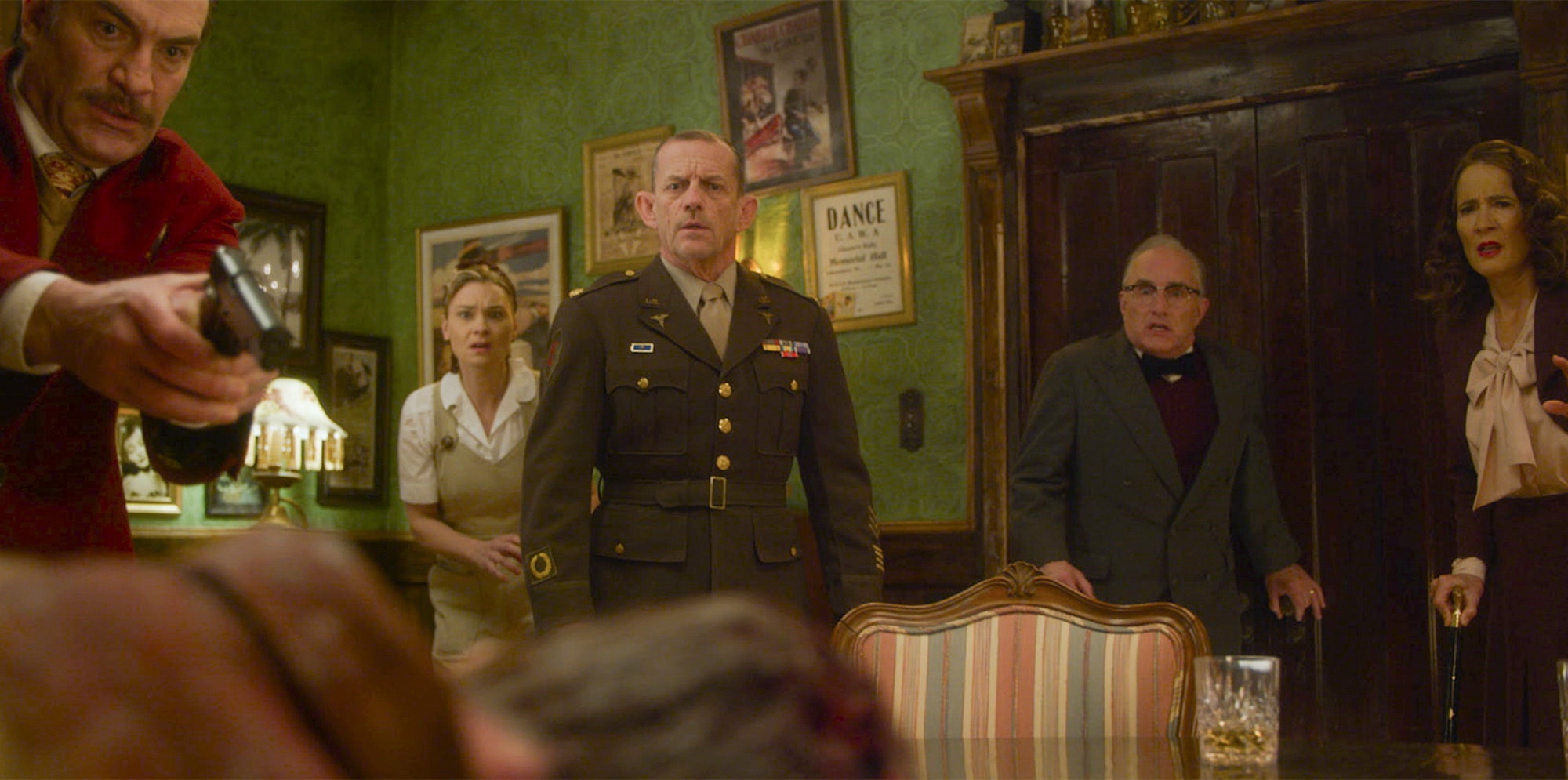
After about 87 minutes of movie and 5 minutes of end credits, Ted Geoghegan’s third feature, Brooklyn 45, ticks away its final moment on a dedication to his father, USAF Staff Sergeant Michael Edward Geoghegan, who passed away in 2019. The junior Geoghegan wrote the film’s script; the senior gave him the background and authentic experience he needed to get each draft in the can. In both a concrete and spiritual sense, Brooklyn 45 is their film. Were Papa Geoghegan here to see it, he’d beam with pride.
That’s parenting. Even when your kids are too young to put their pants on frontwards by themselves, you marvel at every developmental milestone; when they’re showing movies at festivals like Fantasia (where Geoghegan premiered his sophomore movie, Mohawk, in 2017) and South by Southwest (where he premiered his debut, We Are Still Here, in 2015), you can rest easy knowing you’ve done right by them. In the case of Brooklyn 45, where the senior’s firsthand knowledge of World War II’s history and fluidity in military language is essential to its efficacy, the emotional investment is heightened. This isn’t a film about Michael Geoghegan, per se, but it wouldn’t exist without him.
It carries all of the markers of a Ted Geoghegan production, too, from his preference for economically sized and firmly bonded casts to his fondness for ghoulishly realized FX. What’s different is the emphasis on the former over the latter. The effects and design are there. They just come second to performance. Brooklyn 45 brings the full brunt of its spookiness to bear when it counts; the rest of the time, it leans into unbearable human suspense. The combination of both sides plays like a long lost, newly discovered Agatha Christie whodunit ghost story.
Brooklyn 45 opens on December 27, 1945, outside of a Brooklyn brownstone where a gang of army pals are reuniting before the year closes: Former interrogator Marla Sheridan (Anne Ramsay), her husband Bob (Rob E. Rains), Major Archie Stanton (Jeremy Holm), Major Paul DiFranco (Ezra Buzzington), and lieutenant colonel Clive Hockstatter (Larry Fessenden), whose home serves as the friends’ gathering place and the film’s sole location. Clive isn’t doing well. A month prior, his wife, Susan, committed suicide after overdosing on fearmongering radio broadcasts; she believed their German neighbors to be Nazi spies so strongly that Clive’s disbelief in her delusion was reason enough to take her own life.
To support their ailing friend, Marla, Bob, Archie, and Paul indulge his request to conduct a séance, contact Susan’s spirit, and help Clive find peace in her departure. No one likes the plan, but their loyalty to Hock endures beyond the war’s end. He needs them. What’s the harm in conducting a parlor show to ease a man’s grief?

Next to no séances held in the history of horror cinema have gone well for the schmucks conducting them, so the question answers itself. The good news: Hock and the gang prove the afterlife’s existence, which means Susan is in a better, or at least another, place. The bad news is that Hock and the gang prove the afterlife’s existence, and ghosts mean a world of trouble for the quintet trapped in Hock’s living room. How they get out is a literal matter of life and death, presented with a side of accountability for the sins of their military service; even soldiers fighting in The Great War are capable of doing collateral damage.
Another director would’ve taken this premise into haunted house territory by gearing plot to maximize scares, and hurling malevolent wraiths left and right at the petrified cast. In fairness, that sounds like a project for Sam Raimi, the master of up-tempo carnival ride horror. But Ted Geoghegan isn’t Sam Raimi. On We Are Still Here, he’s more of a Lucio Fulci. On Mohawk, he’s more of a Peter Carter or a John Boorman. In Brooklyn 45, he’s broadly in Hammer horror mode. Three pictures into his career, Geoghegan feels the most like himself to date here, wringing suspense out of each passing second so that fear catches in your throat like cold air in winter. The idea of what “directed by Ted Geoghegan” means has crystallized into a niche all his own, with an aesthetic as rich as the whiskey on Hock’s cellarette.
This is almost certainly the product of Brooklyn 45’s beating heart: the personal details that went into its conception. For Geoghegan, what happens to Marla, Bob, Archie, Paul, and Hock — imprisoned by four walls for as long as it takes to get them all to ‘fess up to their misdeeds — is shaped by reaching out to his father and looking inward at his own loss. He’s made a war movie, the kind that most will blithely neglect to consider a war movie on account of the absence of a war: no firefights, no tank duels, no mass graves littered with corpses, no explosions. But war doesn’t end for combatants, much less witnesses. In Brooklyn 45, it follows these veterans back to the U.S. of A. They’re damned. They fought the Nazis, they won, and still: They’re damned.
Geoghegan being an outspoken advocate of inclusion, tolerance, and compassion, it’s natural that the film hinges on a subplot weaving themes of nationalism, othering, and xenophobia into its narrative. For some, the message may read as didactic. But it makes sense that Brooklyn 45 should be this blunt, because Americans forget, and so easily that it seems on purpose, that their country is founded on ostensibly inclusive principles: tired, poor, huddled masses yearning to breathe free, as the poem goes. The dialogue capturing these concepts is hard-nosed, no-nonsense, and happily ends up talking to, not at, the viewer.
Geoghegan’s casting helps. Fessenden is one of horror’s good old reliable mainstays, and Buzzington, having worked with Geoghegan on Mohawk, taps right into Paul’s vein of intransigent jingoism. But Ramsay steals the show. She’s a torturer, but a torturer with conscience, the most clear-eyed person in the group and yet still vulnerable to her pals’ darkest secrets. She is Geoghegan’s moral center. Most artists might balk at putting a torturer in that role. For Geoghegan, Marla is essential – though nothing, and no one, is more essential to what makes Brooklyn 45 than SSGT. Geoghegan. Maybe this film is Ted’s way of reaching out to his dad beyond the veil.







